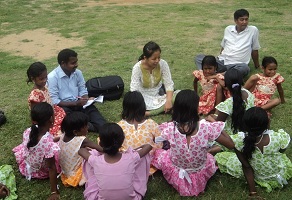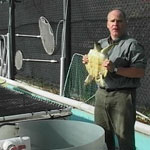Anita, an adolescent girl of 17, who was in Snehalaya for the last seven years, has been reunited with her married elder sister who was overjoyed to re-discover her long lost sister. But Preety, a cute little child of 4 is unwanted by her mother, for reasons known only to her. The mother is estranged from her husband. Preety is in Auxilium Snehalaya and her brother in Ila Snehalaya.
Ranjit's story is even more tragic. His father died, mother is mentally ill and he ran away from the boarding school where he was kept for education and reached Snehalaya two years ago. Radhika, the mal-nourished girl suffering from tuberculosis has improved very much. It is a joy to look at her face which she lights up with a bright smile whenever someone greets her.
These are stories of children who are in need of care and protection and children in conflict with law and who have managed to find succour in Snehalaya, meaning "house of love". The world has been unkind to them, they have not been able to live their childhood in its true spirit. They were at risk, vulnerable to dreadful situations in absence of proper care and protection. They loitered around in Railway stations, bus stations or might have been in different abusive conditions. They were mentally challenged, oblivious of the world around them. They were from broken families either working to earn their living, or might have been the victims of any disasters, natural or man- made.
They were the destitute children, the children who were in need of shelter, love and guidance. They were quintessentially deprived of their basic rights-the right to education and the right to live a healthy and hygienic life. Yet they were fortunate enough to be sheltered by Snehalaya, which work with the vision to bestow them with the rights to survival, protection, development and participation.
Essentially a social service programme of Don Bosco society, Snehalaya turned into a full-fledged shelter home for the underprivileged children over the time. Launched officially in 2000 by the Don Bosco Salesians of Guwahati, commemorating the birth anniversary of Saint John Bosco, it became functional from 2001. Father Luckose Cheruvalel, the Founder Director of Snehalaya, took the initiative by making the base from a small hut in Dhirenpara, which served as his dwelling place also. The very next day of setting up the establishment, eight children being rescued from the Railway station were sent to him by the Missionaries of Charities of Blessed Mother Teresa of Kolkata. Gradually, the organization flourished with its dedication and hard work, spreading its wings according to the needs of the children. There are now five Snehalaya Homes across the city of Guwahati_ Paltan Bazar, Dhirenpara, Beltola, Noonmati and Betkuchi, providing short or long stay for the destitute children. At present they are homing about 200 children who are under the tender care of 60 staff members. The children receive medical care, education, recreation and counseling along with the fundamental needs. Snehalaya also creates opportunities for them to develop their faculties. Skill based trainings are offered to the older children with the view to make them self sufficient. A visit to any of the Snehalaya centres would make one sense the pleasant and jovial ambience that prevails there, emanating the spirit of love and affection.
Each Snehalaya centre works in definite levels. The Dhirenpara Children's Home, which initially could only accommodate a handful of boys, has been transformed into a three storey RCC building now to meet the growing number of boys. It could become possible by the financial support obtained from Manos Unidas (Spain) and Mission Office (New Rochelle). The centre serves as the home for the 50 boys within the age group of seven to 16 years, studying in government run schools and some of them stay in hostels as well who return to the centre during the vacations. Some are undergoing vocational trainings too and the centre also has the facilities of a mini computer lab and a library.
Similarly, the Noonmati centre came into being in 2003 with the view to render safe shelter for the girls who were wandering in the streets and railway stations. With dormitories, prayer hall and playing area for the children, this centre specifically looks after the abandoned girl child, providing them with emotional and psychological security in order to get over of their traumatic past. As it has always been the case that a girl child is more vulnerable to human trafficking, leading to selling them to the elderly men in the states where the man and woman ratio is declining, as well as forcing them to flesh trade, it becomes highly imperative to keep them away from the clutches of those goons engaged in such trading. They are kept there either for long or short stay according to requirement. A very homely atmosphere prevails there for them, where they go to school, return, and indulge in recreations like singing, dancing, craft and art.
It also serves as the night shelter for the Government project for night shelter for the girl-children. As a noble venture on the part of Snehalaya team, many of such girl-children have been reintegrated to their families. The Jyoti Snehalaya in Beltola also homes girl children as well as boys under the age of ten. Those children have either gone through extremely difficult situations or are from dysfunctional families. Chaotic homely environment leads to running away of the children from their homes.
Counseling sessions are held for them at regular intervals to boost up their mental and emotional health. Another centre in Betkuchi, near Balaji Temple predominantly homes children suffering from different physical and mental disabilities. It has an ambulance for emergency service as well as provision for physiotherapy, speech therapy, and special education which is carried on in collaboration with Sishu Sarothi, a well-known NGO working for the disabled children. The staff of Snehalaya is also trained by them to meet the needs of such children. Established in the year 2010, the Paltan Bazar centre accommodates the senior boys who grew up in the other Snehalaya centres. It also functions as the drop-in centre for homeless boys. Nevertheless, Snehalaya also takes up different other activities such as literacy classes and day shelter for the children of poor parents keeping in mind the diverse need of the children to live a decent childhood.
In a region, where the organizations like Snehalaya is toiling hard to make it child-friendly, the future of the children like Mazibul and Saheb still seem bleak. The child rag-pickers, ubiquitous in almost near all garbage dumping sites, even after living with their parents are subject to appalling circumstances. Mazibul, from Sijubari, Hatigaon area was found ransacking a dustbin near ABC bus-stop. When asked he said during free time he does it, else he goes to a school under Axom Sarba Siksha Abhijan mission. It is the poor financial condition of his family which has compelled him to indulge in rag-picking to earn some money.
In case of Saheb, it is a full time job. This nine-year-old boy has never gone to a school. His mother sends him every day to collect the rubbish which is then sold in Rs 10 per kg. Needless to say that that the children in the slums in Guwahati are in acute risk. Except a few, most of the children do not go to school, particularly the girl children. Many young boys are under the grasp of inhalants, affecting their health immeasurably. They are in fact put into exploitable situations purposely, circumstances are framed against them so that they can be indulged in thefts, snatching and scores of other such crimes. Furthermore, addiction in the children, chiefly found among the boys, also decreases their life span as they become prone to accidents, leaving them either handicapped or dead.
Snehalaya functions under Juvenile Justice Act 2000, working for the children in need of care and protection and for those who are in conflict with law, till the age of eighteen. To what extent does the Juvenile Justice Act law is implemented in practical terms becomes the matter of prime concern for an organization working in the field of child line. The children in Snehalaya are mostly from the North-East and most of them are rescued from Guwahati, as the city is the gateway to other North-East states. The constantly increasing number of destitute children in the city is due to migration of people who are by and large from very poor backgrounds. The children of such families are engaged in different kinds of labour to earn for the family. In such situations they easily become the victims of trafficking, organ transplantation and at the worst they are deliberately handicapped for begging. A huge network of such mafia works in the city. It is a usual sight in the different locations of the city that the children are dropped in particular places for begging in the day time and in the evening they are picked up from there. It is all happening under the nose of the authorities, yet no stern action seems to have been taken.
As a genuine effort by Snehalaya, it has been advocating for child rights to make the region child friendly with the means of workshops, consultations, seminars, lobbying etc are undertaken though the Paltan Bazar centre. All Assam Forum for Child Rights, which is a network of NGO's, groups and individuals, works in association with Snehalaya with the same aim. Rajeev, the co-ordinator of Snehalaya laments the fact the cases they handle are a few out of the numerous, which go unnoticed. The criminals targeting the children in the city are so active that once a few children from Snehalaya became the victims of trafficking. Fortunately, they were rescued by an conscious person in Barapani, recognizing them by the photographs in the advertisement published in the newspapers by Snehalaya.
Such awareness on the part of every conscious citizen is what the need in the current state of affairs. Small groups like children's club, civil society groups and in fact every individual can be pro-active against any violation of child rights. They can campaign in their own areas, spreading awareness, primarily against domestic child labour.
Though many upcoming projects by Snehalaya are on the line, they are pulled back by their limitations of fund which is mostly contributed by foreign groups and individual. It is due to lack of funds that only a few children can be sent to private schools. Some of the children are sponsored by corporate groups like Airtel and educational institutions like South Point School, which a commendable endeavor on their part. A survey on the street children is going to be conducted soon to discern the various risks hovering over the children, so that it become possible in future to keep a tab on them. Whatsoever, the utmost aim of Snehalaya is to give its children a proper home and family, either reintegrating them to their original families which is their major priority, or encouraging those families whose children are away to include them.
Find us on facebook: facebook.com/TheThumbPrintMag

.jpg)





































